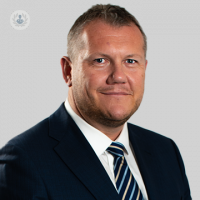How do different forms of arthritis affect the shoulder?
Written by:Compared to other joints within the body, such as the hips and knees, the shoulder is less commonly affected by arthritis. Nonetheless, the condition can cause significant pain and seriously affect range of movement and function of the affected arm. In this detailed guide to arthritis of the shoulder, highly experienced consultant orthopaedic surgeon of the shoulder Mr Tony Corner explains how different forms of the condition affect the joint and how they are treated.

Are there different types of arthritis which affect the shoulder?
There are various different forms of arthritis which can affect the shoulder. Osteoarthritis is the most common form of the condition and is often referred to as ‘wear and tear’ arthritis. Despite this, the exact cause of osteoarthritis has not yet been determined but several factors are known to make a person likely to develop it, including:
- Family history of the condition
- Prior trauma to the area, particularly fractures or dislocations
- Overuse of the shoulder joint, such as heavy manual work, weight-lifting and some sports
Additionally, inflammatory arthritis (also known as rheumatoid arthritis) and rotator cuff arthropathy can affect the shoulder. Inflammatory arthritis affects many areas of the body and is related to the body’s immune system.
When a person is affected by rheumatoid arthritis, the body mistakenly attacks the joints which leads to widespread damage and inflammation. Rotator cuff arthropathy is a different form of arthritis which can develop following large tears and damage to the deep tendons of the shoulder. This form of the condition is rare but unfortunately, it does seriously affect the patient’s mobility in the area as it has a significant impact on the mechanics of the shoulder
What symptoms do patients experience?
Patients who have developed arthritis in the ball and socket shoulder joint typically experience the following symptoms:
- Pain which catches, creaks and worsens when the arm is moved
- Stiffness in the joint
- Difficulty lifting the arm above shoulder height, rotating it or reaching behind the back
- Pain during the night which can disturb sleep
- Difficulty sleeping or resting on the affected side
- Difficulties performing daily tasks which require the arms to reach head height or above, such as styling hair or reaching into high cupboards
- Grinding or clicking in the shoulder when it is moved
How is arthritis of the shoulder treated?
Treatment for arthritis of the shoulder varies according to the form of the condition that the patient is suffering from.
In cases of osteoarthritis, physiotherapy is the first line of treatment with exercises that aim to increase movement and strength in the joint, along with painkillers and anti-inflammatory medication. Supplements, such as glucosamine tablets, may also be beneficial in the earlier stages of the condition.
For patients suffering from rheumatoid arthritis, specialist advice from a rheumatologist is needed to find the right medication to both suppress the condition’s symptoms and prevent it from progressing further.
Additionally, a steroid injection into the shoulder joint may offer short-term relief from pain and stiffness in the area. In the early stages of the condition, an innovative type of injection in which hyaluronic acid acts as an artificial lubricant may also be beneficial. Although these injections have been proven to be effective for longer and have fewer side-effects than steroids, they are costly and are often not covered by insurance companies. It’s also important to note that their effects are most likely to only be temporary.
When is surgery necessary?
If conservative (non-surgical) measures do not provide relief from the symptoms of arthritis of the shoulder, surgery may be considered. One surgical option is to debride the joint in an arthroscopic procedure (key hole), in which the rough surface of the cartilage can be smoothed and any residual debris can be removed. Releasing the stiff capsule which develops in arthritis can also improve the range of movement of the joint. However, this usually only offers short-term relief from the symptoms of the condition and is therefore only beneficial for patients looking to avoid shoulder replacement surgery.
In cases where pain in the joint has become constant and a decrease in the range of movement is affecting quality of life, a shoulder replacement should be considered. This may involve a total replacement of the joint, in which the surface of the ball and socket are replaced, or a hemiarthroplasty joint replacement, in which only the surface of the ball part of the joint is replaced.
If you are concerned by the symptoms of arthritis of the shoulder and wish to discuss your treatment options Mr Corner, you can schedule a consultation with him by visiting his Top Doctors profile.


